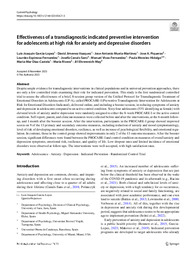Title:
Efectiveness of a transdiagnostic indicated preventive intervention for adolescents at high risk for anxiety and depressive disorders |
Authors:
Garcia‑Lopez, Luis‑Joaquin
Jimenez-Vazquez, David 
Muela-Martinez, Jose-Antonio
Piqueras, Jose A 
et al. |
Editor:
Springer |
Department:
Departamentos de la UMH::Psicología de la Salud |
Issue Date:
2023-12-14 |
URI:
https://hdl.handle.net/11000/36133 |
Abstract:
Despite ample evidence for transdiagnostic interventions in clinical populations and in universal prevention approaches, there
are only a few controlled trials examining their role for indicated prevention. This study is the frst randomized controlled
trial to assess the efectiveness of a brief, 8-session group version of the Unifed Protocol for Transdiagnostic Treatment of
Emotional Disorders in Adolescents (UP-A), called PROCARE-I (Preventive Transdiagnostic Intervention for Adolescents at
Risk for Emotional Disorders-Indicated), delivered online, and including a booster session, in reducing symptoms of anxiety
and depression in adolescents compared to an active control condition. Sixty-four adolescents (53% identifying as female) with
elevated levels of anxiety and/or depression were randomly assigned to either the 8-week PROCARE-I or the active control
condition. Self-report, parent, and clinician measures were collected before and after the interventions, at the 6-month followup, and 1 month after the booster session. After the intervention, participants in the PROCARE-I group showed improved
scores on 9 of the 13 primary and secondary outcome measures, including reduction of anxiety and mood symptomatology,
level of risk of developing emotional disorders, resilience, as well as increase of psychological fexibility, and emotional regulation. In contrast, those in the control group showed improvements in only 2 of the 13 outcome measures. After the booster
session, signifcant diferences were found between the PROCARE-I and control condition on measures of overall anxiety and
depression symptoms, emotional risk, resilience, and quality of life. Low dropout rates and limited incidence of emotional
disorders were observed at follow-ups. The interventions were well-accepted, with high satisfaction rates.
|
Keywords/Subjects:
Adolescence
Anxiety
Depression
Indicated Prevention
Randomized Control Trial |
Knowledge area:
CDU: Filosofía y psicología: Psicología |
Type of document:
info:eu-repo/semantics/article |
Access rights:
info:eu-repo/semantics/openAccess |
DOI:
https://doi.org/10.1007/s12144-023-05421-3 |
Published in:
Current Psychology, Volume 43, pages 15484–15498, (2024) |
Appears in Collections:
Artículos- Psicología de la Salud
|

.png)
